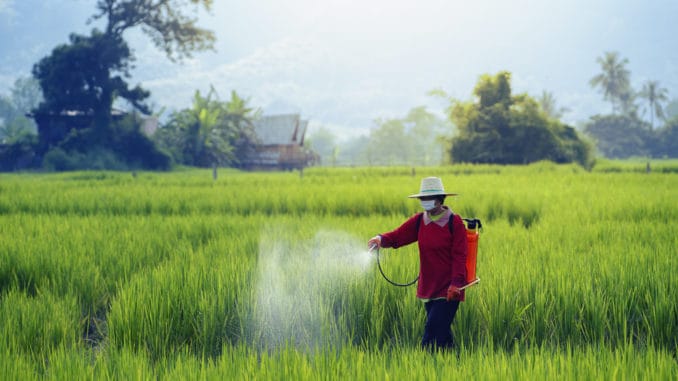
[cmamad id=”25530″ align=”center” tabid=”display-desktop” mobid=”display-desktop” stg=””]
Everyone says this is safe but it’s not…
—-Important Message—-
Lower your blood pressure naturally by eating one of these 5 foods every day

These 5 delicious foods naturally lower men’s blood pressure, and they work even better than the pills.
How? Well, these 5 foods improve blood flow. Blood pressure treatments don’t do that.
And bad blood flow is the cause of high blood pressure.
So all you have to do is add just one of these 5 foods to your breakfast in the morning…
And you’ll have perfect pressure, 120/80, in 2 weeks.
———-
Warning: Surprisingly “Safe” Chemical Giving Men High Blood Pressure
When new pesticides are introduced, people are told that they will only affect plants.
But it usually turns out that pesticides have detrimental effects on human health too.
In the last few years, researchers have uncovered a link between high blood pressure and pesticides.
And because it doesn’t take much, we are all getting more than enough of this pesticide to raise our blood pressure (and do other harm).
Here’s how to avoid it…
First the study.
They looked at the relationship between blood pressure and pesticide spraying season.
The study found that the risk of high blood pressure in children was much higher closer to spraying season.

These researchers carried out human research at the University of California, San Diego, and the University of Minnesota. They published their results in Environmental Research.
The study looked at children living in a rural region of Ecuador.
This region of Ecuador has one of the highest concentrations of flower plantations in the world.
Every May, they harvest masses of flowers for Mother’s Day.
This harvest coincides with a peak of pesticide spraying in the region.
“We included blood pressure information of 313 children aged between four and nine years old in the Ecuadorian agricultural communities of the study.”
The researchers took the blood pressure of hundreds of children at different time points between 63 and 100 days after the harvest.
“Examinations occurred during a period of low flower production, but within 63–100 days following the Mother’s Day harvest.”
Blood pressure readings that were taken more closely to the Mother’s Day flower harvest were higher.
“There was an inverse relationship between time after the spray season with percentiles of systolic per 10.9 days after the harvest: and diastolic blood pressure.”
The closer in time the readings were to the pesticide exposure of the harvest, the higher the blood pressure readings were on average.
The rates of high blood pressure doubled every 11 days nearer to the harvest.
“For every 11 days that a child was examined sooner after the harvest, the odds risk of elevated blood pressure/hypertension doubled.”
Blood pressure increased as blood pressure testing neared the time of high pesticide exposure.
“Children examined sooner after a heightened pesticide spray period had higher blood pressure and pesticide exposure markers than children examined later.”
Flower pesticides affect an enzyme in humans called acetylcholinesterase.
This enzyme has a number of effects on the human cardiovascular system.
And it is suspected to affect blood pressure.
The study found changes in the acetylcholinesterase enzyme in the children in the study.
“Time after the harvest was positively associated with acetylcholinesterase.”
Prior studies have shown that changes in this enzyme are a very good marker for pesticide exposure.
“Acetylcholinesterase is a stable marker of exposure to organophosphate and carbamate insecticides (lower values reflect greater exposure).”
This supports the idea that these pesticides increase blood pressure.
This is not the first time that there have been reports of increased blood pressure from pesticides.
“A number of studies reported positive associations between blood pressure and pesticide exposure constructs based either on self-reports or biomarkers.”
These types of pesticides are used to control mosquitoes and other insects.
[cmamad id=”25531″ align=”center” tabid=”display-desktop” mobid=”display-desktop” stg=””]
People who are regularly exposed to these pesticides have higher blood pressure.
“Pesticide exposed workers who were regularly involved in mosquito control, had higher blood pressure than non-exposed workers.”
Animal experiments have found similar results.
Rats exposed to these types of pesticides had higher blood pressure.
“Positive associations with blood pressure were also observed in an experimental study of rats who were exposed to the pesticide chlorpyrifos.”
More and more research is showing the detrimental effects of pesticides on human health.
We can now add increased blood pressure to the list of risks associated with pesticide exposure.
“Our findings agree with the few existing studies on the relationship between pesticide exposures and blood pressure.”
You should always consult a healthcare practitioner about treating and diagnosing health-related problems.
—-Important Message for Men Who Want Higher Testosterone—-
Keith told me: “When I started your program, my testosterone level was 304.”
(That’s very low)
We talked… And after a while, he wrote to me again:

This man can expect to double his testosterone again…
———-

- Blood pressure after a heightened pesticide spray period among children living in agricultural communities in Ecuador
https://www.sciencedirect.com/science/article/pii/S0013935119302889?via%3Dihub
- Study shows pesticide exposure may raise blood pressure in children
https://www.upi.com/Health_News/2019/05/23/Study-shows-pesticide-exposure-may-raise-blood-pressure-in-children/5971558613155/ - Blood Pressure in Relation to Concentrations of PCB Congeners and Chlorinated Pesticides
https://www.ncbi.nlm.nih.gov/pmc/articles/PMC3059993/
